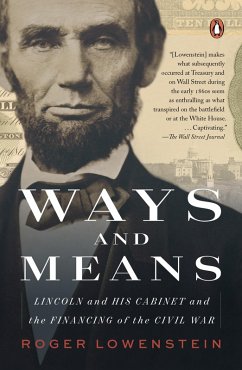From renowned journalist and master storyteller Roger Lowenstein, a revelatory financial investigation into how Lincoln and his administration used the funding of the Civil War as the catalyst to centralize the government and accomplish the most far-reaching reform in the country's history Upon his election to the presidency, Lincoln inherited a country in crisis. Even before the Confederacy's secession, the Treasury of the United States had run out of money, and had no authorization to raise taxes, no federal bank, and no currency. But from setbacks Lincoln foresaw opportunity, the chance to legislate in the spirit of the "more perfect union" - the very Hamiltonian ideal of centralism to which the Confederates objected. With Lincoln at the helm, the US would now govern "for" its people: it would enact laws, create departments, make available homesteads, build roads, establish a currency, endow universities, raise armies, and impose taxes, for them. Lincoln appointed Salmon Chase, his former rival for the Republican presidential nomination, as Secretary of the Treasury. Chase, an ardent abolitionist, waged war on the financial front: levying taxes, marketing bonds, and fighting inflation. And while the Union and Rebel armies fought increasingly savage battles, the Republican-led Congress enacted a blizzard of legislation that made the government, for the first time, a powerful presence in the lives of ordinary Americans, offering a visible hand in the hope that, as Lincoln wrote, "every man [might] have the chance." What followed was no less than revolutionary: The 37th Congress legislated for a transcontinental railroad, involved the federal government in agriculture, education, and land policy, and established a progressive income tax and the internal revenue bureau; it could be said it created the government itself. The Union was now self-sustaining, but concurrently the South was in freefall, having failed to leverage its control of the world's cotton supply to finance the war. The Confederacy's flaws were evident within its founding principles: no central authority, which meant no taxing power, and no financial assets. The subsequent collapse of the Southern economy was one of epic proportions. Though Confederate troops continued to hold their own, the financial advantage enjoyed by the North compared to the starving citizens of the Confederacy was decisive; the war was won not on the battlefield, but in the banks. Here for the first time, Roger Lowenstein reveals the unlikely story of how Lincoln used the urgency of financing the Civil War to transform a union of states into one united nation. Through a financial lens, he explores how this second American revolution, led by Lincoln, his cabinet, and his congress, completely changed the direction of the country and established, for the first time, a government of the people, by the people, and for the people.
Dieser Download kann aus rechtlichen Gründen nur mit Rechnungsadresse in A, B, BG, CZ, D, DK, EW, E, FIN, F, GR, HR, H, I, LT, L, LR, NL, PL, P, R, S, SLO, SK ausgeliefert werden.









